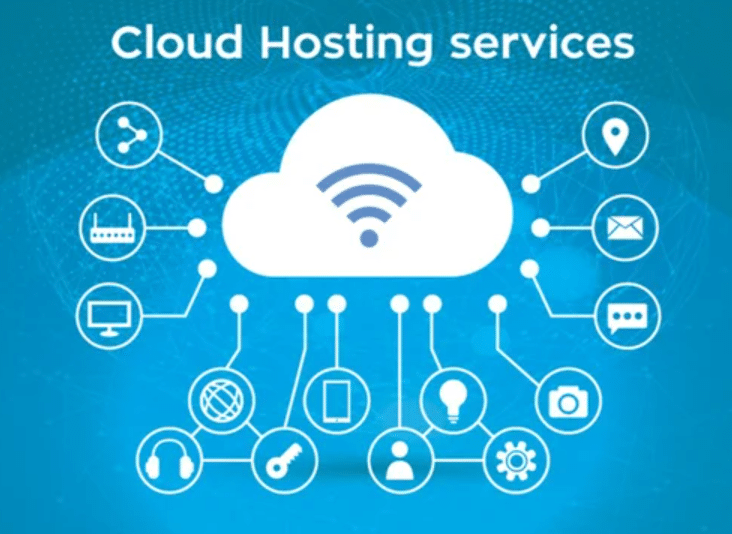Cloud Server Services – In an increasingly interconnected and digital-first world, data is the heartbeat of modern businesses. Whether it’s startups, growing enterprises, or large corporations, the ability to access, store, and process data efficiently and securely is essential to staying competitive. Among the various innovations in technology, cloud server services have emerged as a cornerstone of this transformation.
Cloud server services provide businesses with virtualized server infrastructure that is accessible via the internet. They eliminate the need for traditional physical servers, offering greater flexibility, scalability, and cost-efficiency. But more than just a replacement for hardware, cloud server services represent a new paradigm in how businesses operate, collaborate, and grow.
This article explores what cloud server services are, their components, types, advantages, common use cases, and key considerations when choosing a cloud provider.

What Are Cloud Server Services?
Cloud server services refer to the hosting and delivery of computing resources — such as processing power, memory, storage, and networking — over the internet through cloud computing platforms. These servers are virtualized, meaning they are not bound to a specific physical device, and can be scaled up or down as needed.
Unlike traditional on-premises servers, cloud servers are managed by third-party cloud service providers (CSPs) like Amazon Web Services (AWS), Microsoft Azure, Google Cloud Platform (GCP), IBM Cloud, and others. Businesses and users can access these services via web interfaces, APIs, or remote desktop connections, paying only for the resources they consume.
Key Components of Cloud Server Services
-
Compute Power
Cloud servers offer on-demand virtual machines (VMs) that can run applications, host websites, or power backend processes. These VMs come in various sizes and configurations to suit different workloads. -
Storage
Cloud storage options include block storage, object storage, and file storage. Businesses can store structured or unstructured data securely and retrieve it when needed. -
Networking
Cloud networking allows servers to communicate securely across regions and zones. Features like load balancers, virtual private clouds (VPCs), and firewalls are often included. -
Security and Access Control
Providers offer role-based access control (RBAC), identity and access management (IAM), encryption, and logging to protect cloud-based resources. -
Backup and Disaster Recovery
Automated backup services and failover solutions help ensure business continuity in case of outages or data loss. -
Monitoring and Analytics
Real-time performance metrics, logs, and monitoring dashboards enable businesses to optimize resource usage and detect anomalies quickly.
Types of Cloud Server Services
Cloud server services can be categorized into different deployment and service models. Understanding these types helps businesses choose the most appropriate architecture for their needs.
1. Deployment Models
-
Public Cloud:
Services are hosted on shared infrastructure and available to multiple customers. This model is highly scalable and cost-effective. -
Private Cloud:
Dedicated servers or infrastructure for a single organization, offering more control and customization. Ideal for industries with strict regulatory requirements. -
Hybrid Cloud:
A combination of public and private clouds, allowing businesses to run workloads across environments while maintaining control over sensitive data. -
Multi-Cloud:
Use of multiple cloud providers to avoid vendor lock-in, optimize cost, or meet specific performance requirements.
2. Service Models
-
Infrastructure as a Service (IaaS):
Offers basic virtualized computing resources over the internet. Users manage the OS, applications, and data. -
Platform as a Service (PaaS):
Provides a platform with tools to develop, run, and manage applications without worrying about the underlying infrastructure. -
Software as a Service (SaaS):
Delivers software applications over the cloud on a subscription basis (e.g., Salesforce, Google Workspace).
Advantages of Cloud Server Services
Cloud server services are not just a technology trend; they offer real, tangible benefits that improve business agility, reduce costs, and foster innovation.
1. Scalability and Flexibility
Cloud services can be scaled up or down based on workload demands. Businesses can instantly add or remove computing power without purchasing new hardware.
2. Cost Efficiency
The pay-as-you-go model allows businesses to avoid high capital expenditures. You only pay for what you use, which makes it ideal for startups and growing enterprises.
3. High Availability and Reliability
Cloud providers offer Service Level Agreements (SLAs) with uptime guarantees, often above 99.9%. Redundant systems and data centers ensure services stay online even during failures.
4. Enhanced Security
Leading cloud providers invest in world-class security infrastructure. Features like encryption, intrusion detection, and compliance support help secure sensitive data.
5. Global Accessibility
Cloud servers can be accessed from anywhere with an internet connection, making remote work and global operations easier and more efficient.
6. Faster Deployment and Innovation
With cloud services, new applications and environments can be deployed in minutes. This agility fosters faster innovation and time-to-market.
Common Use Cases for Cloud Server Services
Cloud server services support a broad spectrum of use cases across industries. Here are some common applications:
1. Web and App Hosting
Businesses host websites, blogs, and web applications on cloud servers for better uptime, scalability, and performance.
2. Data Backup and Archiving
Cloud servers provide secure, automated backup solutions that protect critical data and simplify recovery.
3. Software Development and Testing
Developers use cloud platforms to create virtual environments for building, testing, and deploying software without setting up physical infrastructure.
4. E-Commerce Platforms
Online stores rely on cloud servers to handle varying traffic loads, manage inventory, and process transactions securely.
5. Machine Learning and AI
Cloud platforms offer powerful computing resources and tools for running AI models, analyzing large datasets, and building intelligent applications.
6. Gaming and Media Streaming
Cloud servers power online gaming and media streaming platforms by ensuring low latency and high availability for users worldwide.
Leading Cloud Service Providers
Several companies dominate the cloud server market, each offering a suite of services tailored to different business needs.
1. Amazon Web Services (AWS)
AWS is the largest cloud provider, known for its vast range of services, global reach, and scalability. Popular offerings include EC2 (Elastic Compute Cloud), S3 (Simple Storage Service), and RDS (Relational Database Service).
2. Microsoft Azure
Azure integrates seamlessly with Microsoft products like Office 365 and Windows Server. It offers strong support for enterprise solutions, DevOps, and hybrid cloud environments.
3. Google Cloud Platform (GCP)
GCP stands out in data analytics and machine learning. Services like BigQuery, AutoML, and TensorFlow make it ideal for businesses focused on data science.
4. IBM Cloud
IBM Cloud is favored for its enterprise-grade solutions and focus on security, AI, and hybrid cloud strategies.
5. Oracle Cloud
Oracle Cloud Infrastructure (OCI) is known for robust database services and is widely used in industries that require mission-critical systems.
Choosing the Right Cloud Server Service
When selecting a cloud provider or service, businesses should evaluate several factors to ensure the platform meets their specific needs.
1. Performance and Uptime
Check provider SLAs and historical uptime records. Latency and response times are also critical for performance-sensitive applications.
2. Security and Compliance
Ensure the provider meets relevant compliance standards (e.g., GDPR, HIPAA, ISO). Look for features like data encryption, firewalls, and monitoring tools.
3. Scalability
Assess how easily the provider allows you to scale resources up or down. Some offer auto-scaling features for dynamic workloads.
4. Pricing Models
Compare pricing structures, including hidden fees for data transfer, storage, or support. Tools like AWS Pricing Calculator or Azure Pricing Calculator can help forecast costs.
5. Integration and Compatibility
Make sure the cloud environment integrates with your current tools, applications, and systems. Support for APIs, SDKs, and third-party services is a plus.
6. Support and Documentation
Reliable customer support and comprehensive documentation are essential, especially for businesses new to cloud technology.
The Future of Cloud Server Services
The evolution of cloud server services is far from over. Emerging trends such as serverless computing, edge computing, and multi-cloud orchestration are shaping the future of IT infrastructure.
-
Serverless computing eliminates the need to manage servers altogether, allowing developers to focus purely on code.
-
Edge computing brings computation closer to the source of data, reducing latency and improving performance for IoT and real-time applications.
-
AI-powered cloud management automates optimization, cost control, and anomaly detection, making cloud operations smarter and more efficient.
As cloud technologies continue to evolve, businesses that embrace these innovations will enjoy faster development cycles, greater resilience, and deeper insights from their data.
Conclusion
Cloud server services are more than a technological upgrade — they are a strategic enabler for modern businesses. By offering scalable, secure, and cost-efficient infrastructure, these services empower organizations to focus on what truly matters: innovation, growth, and customer satisfaction.
From hosting websites and managing data to running advanced analytics and AI workloads, the cloud provides the agility and power needed in today’s fast-paced digital world. Choosing the right cloud server services is a decision that can shape the future of your business — and with the right approach, the cloud isn’t just an option; it’s an advantage.
